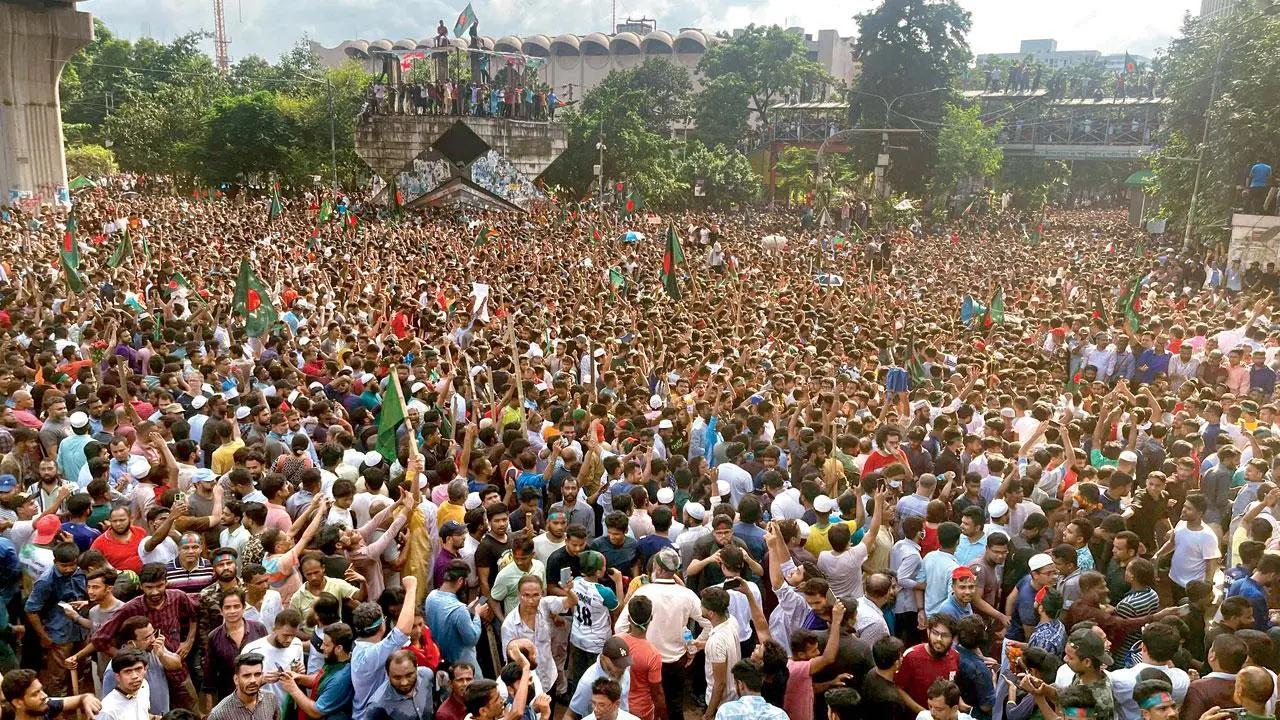Massive protests erupted around the country, led by the Anti-Discrimination Student Movement, which sought improvements to the government job quota system. The government's brutal crackdown on dissent prompted protesters to seek the resignation of Prime Minister Sheikh Hasina.

People gather in Dhaka, Bangladesh, on August 5, the day Chief of Army Staff General Waker-Uz-Zaman announced Prime Minister Sheikh Hasina had resigned after weeks of unrest. Pic/PTI
Bangladesh's inflation rate surged to a 12-year high of 11.66 per cent in July, driven by widespread student protests against a controversial job quota system, according to the Bangladesh Bureau of Statistics. This marks a sharp increase from the 9.72 per cent recorded in June.
ADVERTISEMENT
According to data released on Monday, food inflation in July reached a record 14.10 per cent, while non-food inflation was 9.68 per cent. In June, the figures were 10.42 per cent and 9.15 per cent, respectively. The previous peak inflation rate was 9.94 per cent in May, reported PTI.
According to the report, massive protests erupted around the country, led by the Anti-Discrimination Student Movement, which first sought improvements to the government job quota system. The government's brutal crackdown on dissent exacerbated the situation, prompting protesters to seek the resignation of Prime Minister Sheikh Hasina.
Following considerable agitation, Hasina, 76, resigned and fled to India last week. An interim government was formed, with Nobel laureate Muhammad Yunus, 84, serving as Chief Adviser, the report added.
The protests and ensuing violence resulted in over 230 deaths in August alone, bringing the total death toll to 560 since the demonstrations began in mid-July, PTI reported. The unrest also led to curfews, internet shutdowns, and disruptions to supply chains, impacting the daily lives of citizens and the operation of businesses. Rail and port services were notably affected.
Reportedly, a recent estimate from the Mastercard Economic Institute (MEI) anticipates a drop in both GDP growth and inflation for Bangladesh in the fiscal year 2025. The country's GDP growth is predicted to fall to 5.7 per cent, and inflation, after spiking at 9.8 per cent in FY24, is projected to ease to 8 per cent in FY25.
Bangladesh unrest: Prof Yunus visits Dhakeshwari temple amid attacks on minorities in Dhaka
Visiting the historic Dhakeshwari Temple in Dhaka on Tuesday, Nobel laureate Muhammad Yunus, the chief advisor to the interim government of Bangladesh, gave assurances to the minority population in Bangladesh about their safety and security within the nation.
"Rights are equal for everyone. We are all one people with one right. Do not make any distinctions among us. Please, assist us. Exercise patience, and later judge -- what we were able to do and not. If we fail, then criticise us," Prof Yunus was quoted as saying by a Bangladeshi news outlet, said ANI.
The ANI report further quoted him saying, "In our democratic aspirations, we should not be seen as Muslims, Hindus, or Buddhists, but as human beings. Our rights should be ensured. The root of all problems lies in the decay of institutional arrangements. That is why, such issues arise. institutional arrangements need to be fixed."
 Subscribe today by clicking the link and stay updated with the latest news!" Click here!
Subscribe today by clicking the link and stay updated with the latest news!" Click here!







